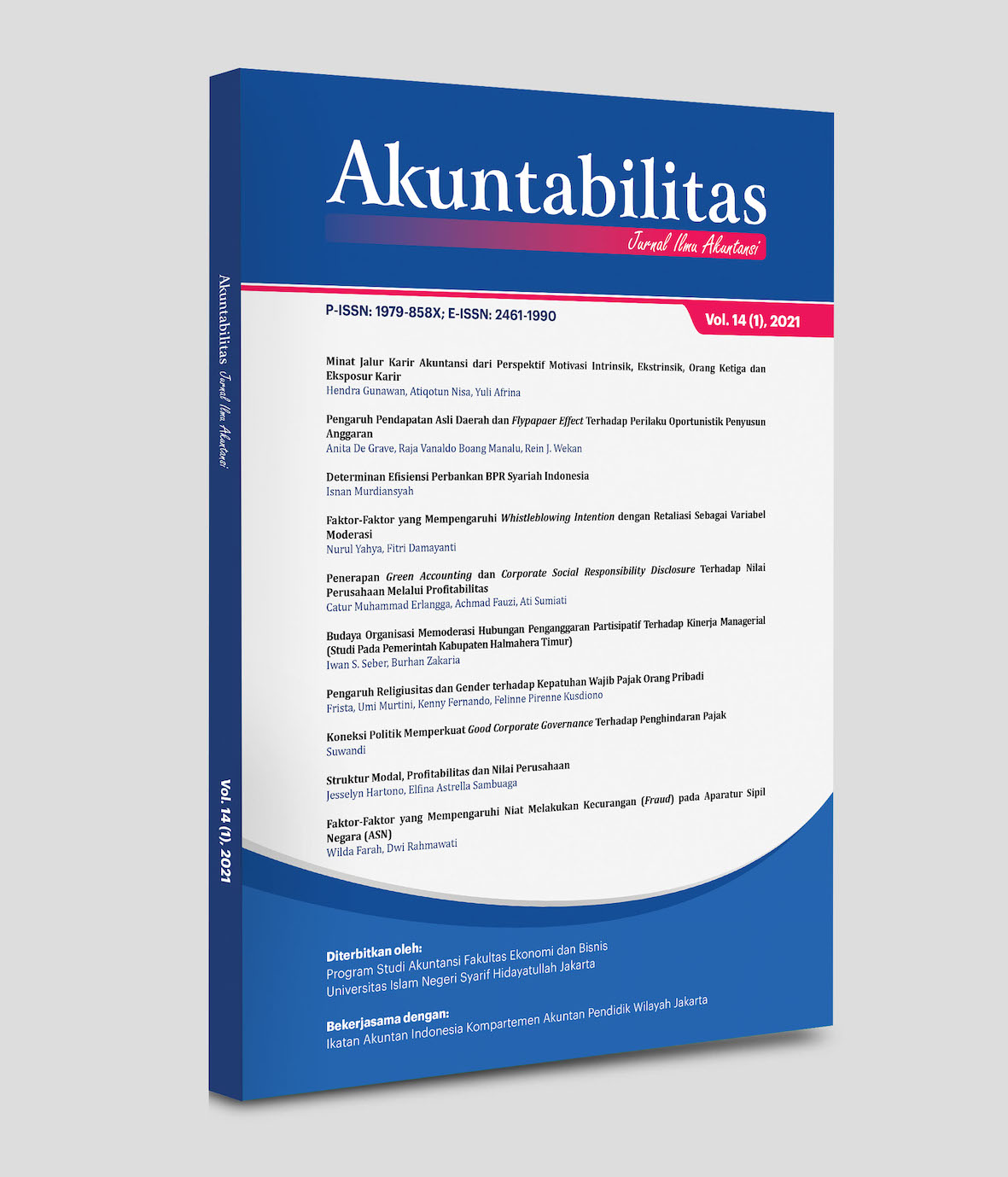Faktor-Faktor yang Mempengaruhi Niat Melakukan Kecurangan (Fraud) pada Aparatur Sipil Negara (ASN)
DOI:
https://doi.org/10.15408/akt.v14i1.20872Keywords:
remuneration system, government intern control system, rationalization attitude, intention to commit fraud, official servantAbstract
The purpose of this study is to examine and produce empirical evidence regarding the factors influencing the intention to commit fraud such as the remuneration system, the government internal control system (SPIP) and the rationalization attitude. This study used a sample of 108 respondents. Respondents in this study were state civil servants (ASN) throughout Indonesia. Data analysis used multiple linear regression analysis and with the help of the SPSS 25 program. The results of this study indicate that there is a significant negative influence of the remuneration system and government control system (SPIP) on the intention to commit fraud. Meanwhile, rational attitude has a positive significant influence on the intention to commit fraud (fraud). Then for the variable remuneration system, government control system (SPIP) and the attitude of rationalization simultaneously influence the intention to commit fraud for Official Servant. (ASN).
References
Ajzen, I. (1991). The Theory of Planned Behaviour, Organizational Behaviour and Human Decision Processes, vol. 50, no.2, pp. 179-211. https://www.sciencedirect.com/science/article/abs/pii/074959789190020T.
Binde, Per (2016). Gambling-related Embezzlement in The Workplace: A Qualitative Study. International Gambling Studies. https://doi.org/10.1080/14459795.2016.1214165.
Calvin, Ojeleye, Yinka (2017). The Impact Of Remuneration On Employees’ Performance (A Study Of Abdul Gusau Polytechnic, Talata-Mafara And State Collage Of Education Maru, Zamfara State). Arabian Journal of Business and Management Review (Nigerian Chapter). Vol. 4, No. 2, 2017. https://www.researchgate.net/publication/318014419_The_Impact_of_Remuneration_on_Employees'_Performance_A_Study_of_Abdul_Gusau_Polytechnic_Talata-Mafara_and_State_College_of_Education_Maru_Zamfara_State.
Crowe, Howarth (2012) “The Mind Behind The Fraudters Crime: Key Behavioural and Environmental Element”.
Dahlia, D. (2013). Analisis Pengaruh Faktor-Faktor yang Berpengaruh Terhadap Tindak Pidana Korupsi. Procedings of Population And Human Resource Development 2. http://ejournal.unp.ac.id/students/index.php/akt/article/view/2587.
Dellaportas, Steven (2012). Conversations with inmate accountants: Motivation, opportunity, and the fraud triangle. Accounting Forum. https://www.researchgate.net/publication/256979345_Conversations_with_inmate_accountants_Motivation_opportunity_and_the_fraud_triangle.
Eliza, Yuliana (2015). Pengaruh Moralitas Individu dan Pengendalian Internal Terhadap Kecenderungan Kecurangan Akuntansi (Studi Empiris Pada SKPD Kota Padang). Jurnal Akuntansi, Vol. 4, No. 1. https://docplayer.info/30800757-Pengaruh-moralitas-individu-dan-pengendalian-internal-terhadap-kecenderungan-kecurangan-akuntansi-studi-empiris-pada-skpd-di-kota-padang.html.
Ghozali, I. (2018). Aplikasi Analisis Multivariate Dengan Program IBM SPSS 25 (9th Ed.).
Greenlee, Janet, dkk (2006). An Investigation of Fraud in Nonprofit Organization: Occurrences and Deterrent. Working Paper No. 35. https://www.researchgate.net/publication/228162620_The_Causes_and_Consequences_of_Internal_Control_Problems_in_Nonprofit_Organizations.
Herawati, Trisna, Nyoman, dkk (2017). Pengaruh Sistem Pengendalian Kas, Implementasi Good Goverment, Moralitas Aparatur Pemerintah Daerah, dan Persepsi Kesesuaian Kompensasi Terhadap Financial Fraud. Vol:7 No. 1. https://ejournal.undiksha.ac.id/index.php/S1ak/article/view/10152.
Martaningtyas, Irna (2014). Pengaruh Tunjangan Kinerja, Sistem Pengendalian Intern, Kultur Organisasi Terhadap Fraud Pegawai Negeri Sipil. Jurnal TEKUN. Vol No. 01: 110-124. https://publikasi.mercubuana.ac.id/index.php/tekun/article/view/280.
MS., Rusli, Budiman. (2010). Kebijakan Remunerasi Berbasis Kinerja. Artikel Guru Besar FISIP Universitas Padjajaran. http://pustaka.unpad.ac.id/wp-content/uploads/2013/10/pustaka_unpad_kebijakan_remunerasi_berbasis_kinerja.pdf.
Nakashima, M. (2017). Can Fraud Triangle Predict Accounting Fraud?. Evidence From Japan. Chiba University Of Commerce, 1-37. https://www.rieb.kobe-u.ac.jp/tjar/conference/8th/CC2_MasumiNAKASHIMA.pdf.
Nisak, Chairun, Prasetyo, Fitri (2013). Sistem Pengendalian Intern Dalam Pencegahan Fraud Pada Satuan Kerja Perangkat Daerah (SKPD) Pada Kabupaten Bangkalan. (Disertasi Tidak Dipublikasikan) Universitas Trunojoyo Madura, Indonesia
Novikasari, Yully (2017). Pengaruh Moralitas Individu, Sistem Pengendalian Intern Pemerintah, dan Ketaatan Aturan Akuntansi Terhadap Kecenderungan Kecurangan Akuntansi (Studi Empiris pada SKPD Kab. Singingi). JOM Fekon. Vol.4 No.1. https://www.neliti.com/id/publications/117544/pengaruh-moralitas-individu-sistem-pengendalian-intern-pemerintah-dan-ketaatan-a.
Pamungkas & Desiana, Dwi (2015). Pengaruh Faktor-faktor dalam Dimensi Fraud Triangle Terhadap Perilaku Kecurangan Akademik Siswa Kelas XI Akuntansi Negeri 1 Tampel Tahun Ajaran 2014/2015. Universitas Negeri Yogyakarta. Diunduh pada 01 Agustus 2020, dari https://eprints.uny.ac.id/25070/.
Peraturan Pemerintah Republik Indonesia No. 60 Tahun 2008 tentang Sistem Pengendalian Intern Pemerintah.
Rendika, Michael (2013). Pengaruh Pelaksanaan Sistem Pengendalian Intern Pemerintah dan Peran Inspektorat Terhadap Penyalahgunaan Aset. Artikel Program Studi Akuntansi Fakultas Ekonomi dan Bisnis Universitas Negeri Padang. http://ejournal.unp.ac.id/students/index.php/akt/article/viewFile/669/426.
Sujana, Edy, dkk (2017). Pengaruh Keefektifan Pengendalian Internal, Kesesuaian Kompensasi dan Budaya Organisasi Terhadap Kecenderungan Kecurangan (Fraud) Pada Lembaga Perkreditan Desa (LPD) Se-Kecamatan Susut. Vol. 8 No. 2. https://ejournal.undiksha.ac.id/index.php/S1ak/article/view/10422.
Susandra, F., & S., Hartina (2017). Analisis Faktor-faktor yang Mempengaruhi Kecenderungan Fraud pada Satuan Kerja Perangkat Daerah (SKPD) di Kota Bogor. Jurnal Akunida, 3 (2), 35-55. https://www.researchgate.net/publication/324500640_ANALISIS_FAKTOR-FAKTOR_YANG_MEMPENGARUHI_KECENDERUNGAN_FRAUD_PADA_SATUAN_KERJA_PERANGKAT_DAERAH_SKPD_DI_KOTA_BOGOR.
Wolfe, David, T., & Dana, R., Hermanson (2004). “The Fraud Diamond: Considering the Four Elements of Fraud”. CPA Journal. 74.12 :38-42. https://digitalcommons.kennesaw.edu/facpubs/1537/.
Zahra, Ami (2017). Pengaruh Tekanan, Kesempatan dan Rasionalisasi Terhadap Tindakan Kecurangan (Fraud) (Survei pada Narapidana Tipikor di Lembaga Pemasyarakatan Kelas II A Kota Pekanbaru). Artikel Jurusan Akuntansi Fakultas Ekonomi Universitas Negeri Padang. http://ejournal.unp.ac.id/students/index.php/akt/article/view/2587.
Zainal, Rizki (2013). Pengaruh Efektivitas Pengendalian Intern, Asimetri Informasi, dan Kesesuaian Kompensasi Terhadap Kecenderungan Kecurangan. Artikel Universitas Negeri Padang. http://ejournal.unp.ac.id/students/index.php/akt/article/view/668.

